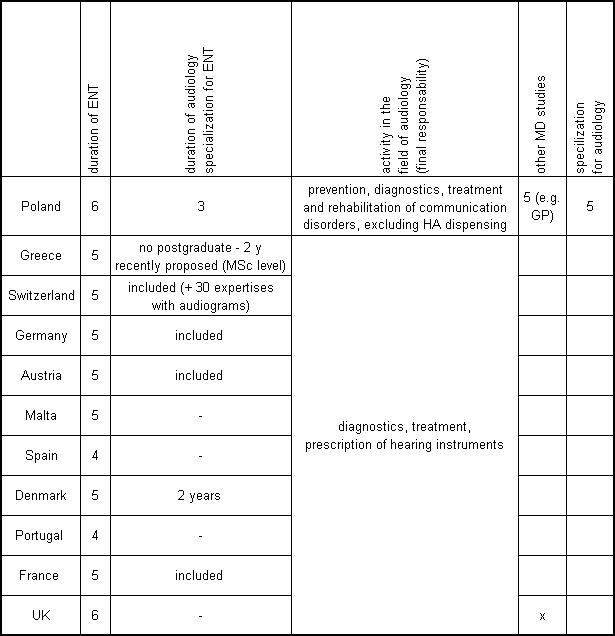Curriculum
This page
contains results from working groups on
Results from working group on Core curriculum for
the "General Audiologist" programs
Basic Knowledge about
- Balance
disorders
- Signal
processing
- Physics
of sound (temporal and frequency domain, acoustics)
- Phonetics,
speech acoustics
- Sound
perception and Psychoacoustics
- Speech/Language
development
- Principles
of measurement
- Electro-acoustics
- Device
technology (understand behaviour of system): hearing aids, auditory
implants, assistive listening devices
- Using
software tools
- Fitting
methods
- Real ear
measurements
- Ear mould
acoustics
- Validation
of fitting
- Evaluation
(basic functioning of devices)
- Evoked
potentials
- Intervention
methods
- Prevention
methods
- Epidemiology
of ear disorders
- Relationship
between professions, ethics, confidentiality issues
- Pediatric
testing, behavioural audiometry
- Cognitive
development and learning,
- Declination
of cognitive abilities with age
- Referral
pathways to other professionals
- Medico-legal
aspects
- (Re-)habilitation
and educational options (including facilities for sign language etc)
Detailed Knowledge about
- Anatomy,
physiology of hearing organ
- Audiometry:
Pure tone, speech
- ABR
- Patho-physiology
of auditory system (peripheral, central ones)
- Otoacoustic
emission
- Tinnitus
- Measurement
of dynamic range
- Tympanometry
- Consequences
of auditory disorders (e.g. handicaps, psychosocial, educational)
Key skills
- Communication
- Team working
- Independent
learning
- Problem
solving
- Critical
understanding of research papers and presentations
Practical skills
- Patient
handling (including parents and siblings)
- Screening
non-diagnostic otoscopy (distinguish normal from non-normal)
- Pure tone
audiometry
- Speech
audiometry
- Tympanometry
incl. acoustic reflex audiometry
- Measurement
of dynamic range, e.g. UCL
- Communication
with hearing impaired people
Results from the working group on 'Minimum requirements
for technical audiology training in a "general audiologist"
program'
Tasks that technical audiologists (university level) have to do:
- Diagnostics
(Common, advanced, interpretation of measures and new inventions)
- Counceling
- Hearing
Aid fitting
- Cochlear
etc. Implant fitting
- Contribution
to devices development
- Hearing
conservation
Knowledge/Skills/Competencies that are required:
Basics:
- Statistics
- Signal
processing
- Physics
of sound (temporal and frequency domain, acoustics)
- Phonetics,
speech acoustics
- Sound
perception and Psychoacoustics
- Speech/Language
development
- Principles
of measurement
- Electroacoustics
- Device
technology (Understand behaviour of system)
- Using
software tools
- Patient
handling (asking questions)
Key skill:
- Communication
- Team working
- Independent
learning
- Problem
solving
Research skills:
- Math
- Methodology
- Understand
communicated research results
Diagnostics:
- Anatomy
and Physiology
- Diagnostic
tests
- Principles
of measurement procedures
Counceling:
- Counceling
skills
- Health
system, legal system, rights
Device fitting:
- Psychology
- Fitting
methods
- Real ear
measurements
- Ear mould
acoustics
- Validation
- Evaluation
(basic functioning of devices)
Contribution to device
development:
Hearing conservation:
- Noise
control
- Hearing
protection
Results from working group on 'MODULES for a Master
in Audiology for ENT Specialists'
A. Basic & Applied Bio-physics of the audio-vestibular system
- Basic
Mechanics
- Vibrations-Waves-Acoustics
- Signal
processing
- Physiological
signals
- Electrophysiology
(EChoG, VEMP’s, ABR)
- Otoacoustic
emissions
- Hearing
aids, Cochlear Implants & Middle ear implants technology
- Psychoacoustics
B. Anatomy & Physiology of the audio-vestibular system
- Molecular
Biology
- Genetics
- Imaging
(functional MRI & vascular imaging)
- Pharmacology
- Basic
Histopathology
C. Research Methodology
- Statistics
- Evidence
Based Medicine Skills
- Critical
Evaluation of Literature
D. Physiology and Pathology of Communication
- Language
development
- Psychology
(cognitive approaches)
- Neurology
of Communication Disorders
- Common
neurological disorders (migraine)
- Speech
& Language Pathology
- Ophthalmology
E. Pathology, Diagnosis & Management of Auditory Disorders
- Tinnitus
- Tinnitus
Retraining Therapy
F. Pathology, Diagnostis & Management of Vestibular Disorders
G. Paediatric Audiology
H. Audiology for Special Populations
- Special
needs
- Musicians
- Geriatric
I. Clinical Training (1/6 of credits: 600 hours)
J. Research Thesis (1/3 of credits)

|

